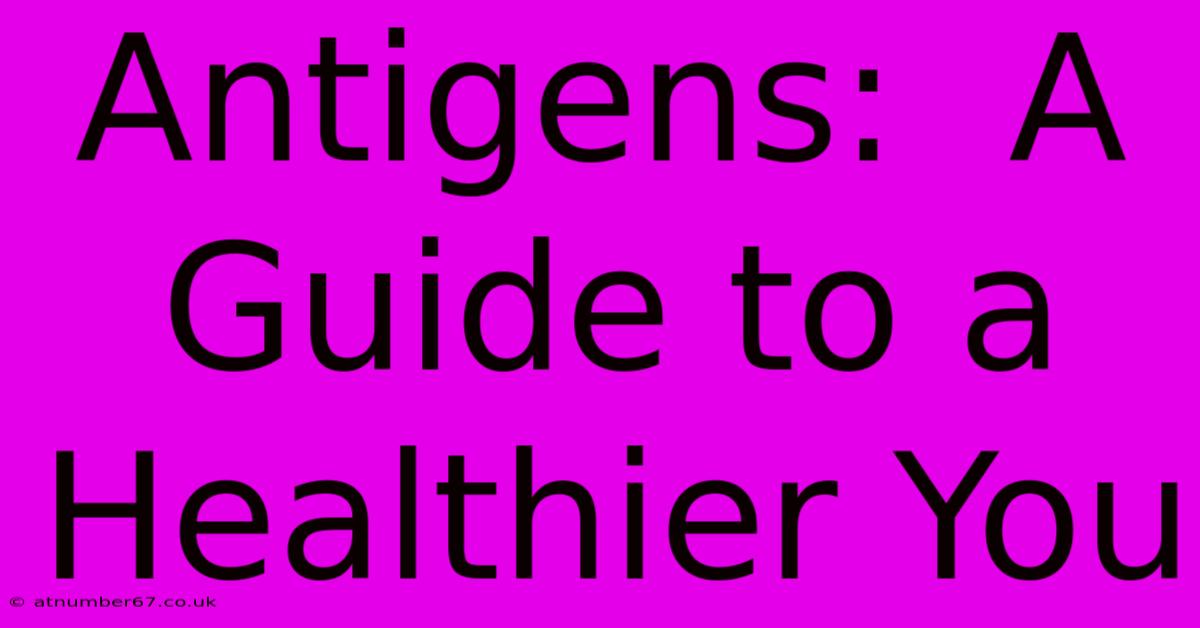Antigens: A Guide To A Healthier You

Table of Contents
Antigens: A Guide to a Healthier You
Understanding antigens is crucial for a healthier life. While you might not hear the term daily, antigens play a significant role in your immune system's function and overall well-being. This comprehensive guide will demystify antigens, explaining what they are, how they work, and their impact on your health.
What are Antigens?
Simply put, antigens are substances that trigger an immune response in your body. These can be anything from bacteria and viruses to pollen, food particles, or even your own cells (in the case of autoimmune diseases). Your immune system recognizes these antigens as "foreign invaders" and mounts a defense to neutralize or eliminate them.
Think of antigens as the "wanted posters" of the immune system. They carry unique molecular markers that allow your immune cells to identify them and initiate an appropriate response.
Types of Antigens:
Antigens are diverse and can be categorized in several ways:
-
Exogenous antigens: These originate outside the body and enter through various routes like inhalation, ingestion, or injection. Examples include bacteria, viruses, fungi, and pollen.
-
Endogenous antigens: These are produced within the body's cells, often as a result of viral infection or cancerous mutations.
-
Autoantigens: In autoimmune diseases, the immune system mistakenly identifies the body's own cells or tissues as foreign, targeting them with an immune response. These self-antigens are referred to as autoantigens.
How the Immune System Responds to Antigens:
When an antigen enters your body, your immune system springs into action. This intricate process involves several key players:
-
B cells: These cells produce antibodies, specialized proteins that bind to specific antigens, marking them for destruction.
-
T cells: These cells directly attack infected cells or help coordinate the immune response. Helper T cells orchestrate the attack, while cytotoxic T cells directly kill infected or cancerous cells.
-
Macrophages and other phagocytes: These cells engulf and destroy antigens, acting as the body's "clean-up crew."
The specific immune response depends on the type of antigen and its route of entry. Sometimes, the response is swift and effective, preventing illness. Other times, the response might be delayed or insufficient, leading to infection or disease.
Antigens and Disease:
Antigens are central to many diseases:
-
Infectious diseases: Viruses and bacteria carry antigens that trigger an immune response. The severity of the infection depends on the strength of the immune response and the virulence of the pathogen.
-
Allergies: Allergies occur when the immune system overreacts to harmless substances like pollen or food, mounting a strong inflammatory response.
-
Autoimmune diseases: Autoimmune diseases arise when the immune system mistakenly attacks the body's own tissues. This can result in a wide range of symptoms and health problems.
-
Cancer: Cancer cells often express unique antigens that can be targeted by the immune system. Immunotherapy is an emerging field that harnesses the power of the immune system to fight cancer.
Boosting Your Immune System's Response:
Maintaining a healthy immune system is essential for effectively responding to antigens. Here are some key strategies:
-
Maintain a balanced diet: A diet rich in fruits, vegetables, and whole grains provides essential nutrients for immune function.
-
Get enough sleep: Sleep deprivation weakens the immune system.
-
Manage stress: Chronic stress can impair immune function.
-
Exercise regularly: Regular physical activity boosts immune function.
-
Avoid smoking: Smoking damages the lungs and weakens the immune system.
-
Vaccination: Vaccines introduce weakened or inactive forms of antigens to stimulate the immune system and build protection against future infections.
Conclusion:
Understanding antigens is fundamental to understanding health and disease. While they are often associated with illness, they are essential components of the intricate immune system that protects you from harm. By maintaining a healthy lifestyle and taking proactive measures to support your immune system, you can enhance your body's ability to combat antigens and promote overall wellness. Consult your doctor if you have concerns about your immune system or any specific antigen-related issues.

Thank you for visiting our website wich cover about Antigens: A Guide To A Healthier You. We hope the information provided has been useful to you. Feel free to contact us if you have any questions or need further assistance. See you next time and dont miss to bookmark.
Featured Posts
-
Son Of A Rich The Gift And Burden Of Inheritance
Apr 01, 2025
-
Paul Merson Jr Scores An Amazing Goal
Apr 01, 2025
-
Diyarbakir Remembering The Life Of The Deceased
Apr 01, 2025
-
The Optimists Daughter Cultivating Inner Strength And Peace
Apr 01, 2025
-
Beyond The Screen Son Suk Kus Personal Life
Apr 01, 2025
